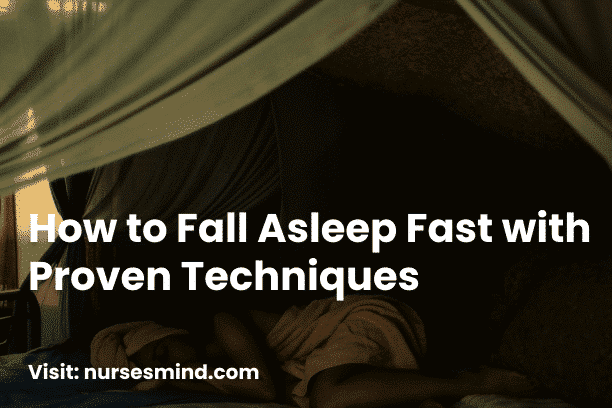You're not alone if you've ever struggled to fall asleep because you couldn't get your mind to shut off. The importance of sleep to our overall health may be seen in how it affects everything from cognitive ability to emotional stamina. But the hectic pace of modern life frequently interferes with our innate sleep cycles, making us long for a restful night's sleep.
This article examines tried-and-true methods and tactics to end insomnia, calm your racing thoughts, and embrace a beautiful night-time trip to dreamland. So get ready to discover the keys to restful sleep as we explore "How to Fall Asleep Fast."
4 Ways to Fall Asleep Fast
Many people with insomnia may lie in bed contemplating how to sleep. When this occurs, a person can try the advice provided below. Some are temporary fixes to attempt now, while others are long-term improvements in lifestyle.
1. Make use of the Military Approach.
It is common for military members to have erratic schedules and frequently sleep in less-than-ideal surroundings, which might disrupt their normal sleep habits. The military method is a strategy that was devised to assist service members in falling asleep in two minutes or less. The following procedures are included in this process:
- Take up a posture that is cozy for you and relax all of the muscles in your face, including those in your eyelids, mouth, lips, and brow.
- Your shoulders should be the first thing to drop as you let your arms rest at your sides.
- Start taking several deep breaths to help relax the chest muscles.
- Start by loosening up your lower half by starting at your hips and descending through each section of your leg until you reach your feet.
- To put your mind at ease, Imagine yourself in a relaxing environment, such as the picturesque countryside, a placid lake, or a warm and inviting room in your own house. If you have unwanted ideas, it is important to acknowledge them and work on overcoming the associated visuals. If you find it difficult to conjure up calming images, try repeating a simple phrase to yourself, like, "Don’t think." Visualization can be a bit challenging.
Don't lose up if you're having difficulties clearing your thoughts right away; the military approach works better the more you use it, so don't give up on it just because you're having trouble. You should find that it takes you less and less time to fall asleep with this method as time goes on.
Read Also: Top Benefits of CBD: 7 Best CBD Products for Pain, Sleep, and Stress
2. Aim to remain awake
Unexpectedly, striving to stay awake is a tactic for trying to fall asleep quickly. Although an impromptu all-nighter isn't ideal, lying up worrying about sleep won't help you fall asleep. Contrary to popular belief, striving to stay awake can help you feel less anxious about trying to sleep.
Don't interrupt the process by looking at your phone or turning on the lights. Instead, attempt:
- Drinking water.
- Using ambient lighting while reading a book.
- Make an effort to maintain eye contact in your dark bedroom.
- Taking your thoughts away from the current task can offer your brain the break it requires for you to quit counting sheep because falling asleep is an instinctive process.
3. Turn off the Clock
Glancing at your clock while trying to fall asleep at night can worsen your sleep anxiety. Try rotating your clock so you can't see the time at night, or turn it off completely.
Make sure your phone is positioned face downward, and put on a sleep mask to block out any light sources and other distractions completely. If you do this, you won't be as compelled to check the clock or engage in late-night web browsing.
4. Consider Melatonin Supplements
Melatonin pills are possible if you feel like all other sleep aids have failed. A hormone called melatonin aids in the body's preparation for sleep. You might experience quicker sleep if you start your evening ritual with melatonin supplements.
A fantastic alternative to sleeping pills is melatonin. To find out if melatonin pills are a good choice, consult your doctor if you're considering doing so.
Conclusion
You can get a quick and peaceful night's sleep by implementing easy yet useful techniques into your nighttime routine. We have looked at several tried-and-true methods to help you fall asleep, including breathing exercises, improving your sleeping environment, and mindful breathing. Always maintain consistency, so be kind to yourself while you develop sound sleeping practices.


